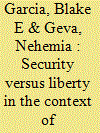|
|
|
Sort Order |
|
|
|
Items / Page
|
|
|
|
|
|
|
| Srl | Item |
| 1 |
ID:
001050


|
|
|
|
|
| Publication |
Boulder, Lynne Rienner, 1997.
|
| Description |
x,256p.
|
| Standard Number |
1555877214
|
|
|
|
|
|
|
|
|
|
|
|
Copies: C:1/I:0,R:0,Q:0
Circulation
| Accession# | Call# | Current Location | Status | Policy | Location |
| 039566 | 327/GEV 039566 | Main | On Shelf | General | |
|
|
|
|
| 2 |
ID:
125110


|
|
|
|
|
| Publication |
2013.
|
| Summary/Abstract |
In recent years, a growing body of research has set out to examine the role that emotions play in shaping political attitudes and behaviors regarding terrorism. However, one major issue that is generally overlooked is whether the thematic relevance of emotive triggers leads to differential effects on people's reactions to international terrorism. Specifically, does anger-regardless of its source-tend to drive people towards supporting an aggressive foreign policy option to counter terrorism, or do the thematic underpinnings of anger (i.e., the specific contents that trigger this particular emotion, such as watching a news story about a recent terrorist attack) matter vis-à-vis the policy choice? To address this gap, this study experimentally examines the impact of anger-induced by thematically relevant versus irrelevant emotive triggers-on people's cognitive processing and foreign policy preferences regarding international terrorism. Overall, we find that the induction of anger via thematically relevant emotive triggers leads to a higher tendency for selecting a military option, a lower amount of information acquisition, and a shorter processing time in response to terror-related incidents.
|
|
|
|
|
|
|
|
|
|
|
|
|
|
|
|
| 3 |
ID:
144927


|
|
|
|
|
| Summary/Abstract |
A critical question in counterterrorism studies concerns the extent to which governments adequately balance the continual provision of individual rights and freedoms with the appropriate level of national security when faced with a terrorist attack. We experimentally assess this tradeoff utilizing a 2 × 2 × 2 between-groups factorial design, manipulating (a) the extent of terror-related threats, (b) the level of invasiveness of subsequent counterterrorism policies, as well as (c) the terror context: transnational and domestic. The results provide evidence that the public is more willing to accept greater reductions in civil liberties under a greater threat of terrorism only when the perceived effectiveness of those policies to prevent future acts of terrorism is high. Furthermore, we find these results to be specific to the context of a transnational terror threat. This suggests that the public will be unwilling to accept reductions in civil liberties when the source of the attack is domestic, regardless of the level of threat or how effective subsequent policies may be in preventing future attacks.
|
|
|
|
|
|
|
|
|
|
|
|
|
|
|
|
| 4 |
ID:
191539


|
|
|
|
|
| Summary/Abstract |
The study explores terrorism threat perceptions, focusing on the American public’s views of conventional and cyber-terrorism methods. Based on a national survey data, we find that when asked about the likelihood and the extent of threat associated with each type of terror method, citizens make clear and significant distinctions. Furthermore, these distinctions translate to variations in counter-terrorism policy preferences. Our analyses reveal that, considering the low level of knowledge of complex security issues, measuring citizens’ `true attitudes’ requires using survey instruments with lower level of abstraction, which force respondents to ‘stop and think’, and better reflect their associated opinions.
|
|
|
|
|
|
|
|
|
|
|
|
|
|
|
|
|
|
|
|
|